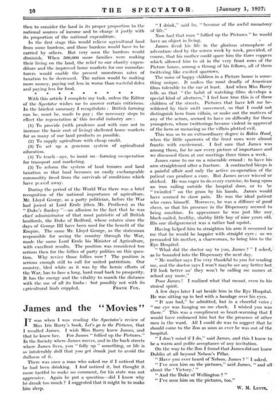James and the " Movies "
T was when I was reading the Spectator's review of Miss Iris Barry's book, Let's go to the Pictures, that I recalled James. I wish Miss Barry knew James, and that he knew her. For James " !billed up the Pictures." In the Society where James moves, and in the back streets where James lives, you " folly up " something, or .life is so intolerably dull that you get drunk just to avoid the dullness of it.
There was once a man who asked me if I noticed that he had been drinking. I had noticed it, but thought it more tactful to make no comment, for his state was not aggressive. Again he put a question—did I know why he drank too much ? I suggested that it might be to make him sleep. drink," said he, ." because of the awful monotony of life."
Now had that man " fullied up the Pictures " he would have an object in living. . • . James lived his life in the glorious atmosphere of adventure shed by the screen week by week, provided, of course, that his mother could spare him the three coppers .which allowed him to sit in the very front rows of the Picture house, among a throng of his fellows, all of them twittering like excited sparrows.
The noise of happy children in a Picture house is some- thing unique. It makes the most deadly of American films tolerable to the car at least. And when Miss Barry tells us that " the habit of watching -films develops a special kind of alertness," I feel how true this is of these children of the streets. Pictures that have left me be- wildered by their swift movement, so that I could not distinguish hero from villain, or make out the motives of any of the actors, seemed to have no difficulty for these youngsters, whose twitterings became violent in approval of the hero or menacing as the villain plotted evil.
This was so to an extraordinary degree in Robin hood, when the little sparrows of the front TOWS were almost frantic with excitement. I feel sure that James was among them, for he saw every picture of importance and we discussed them at our meetings three times a week.
James came to me on a miserable errand : to have his arm straightened after a fracture. A contracted biceps is a painful affair and only the active co-operation of the patient can produce a cure. But James never winced or shirked. He was eager to do every exercise, to hang upon an iron railing outside the hospital door, or to be " twizzled " on the grass by his hands. James would have scorned to show pain. He was the ideal patient who cures himself. Moreover, he was a diffuser of good- cheer, so that his presence in the Dispensary seemed to bring sunshine. In appearance he was just like any black-nailed, healthy, shabby little boy of nine years old. His one disfigurement was a rather bad squint.
Having helped him to straighten his arm it occurred to' me that he would be happier with straight eyes ; so we persuaded his mother, a charwoman, to bring him to the Eye Hospital.
" What did the doctor say to you, James ? " I asked, as he bounded into the Dispensary the next clay.
" Me mother says I'm very thankful to you for sending me, and the doctor says I won't maybe see any better but I'll look better an' they won't be calling me names at school any more."
Poor James ! I realized what that meant, even to his stoical spirit.
A few days later I sat beside him in the Eye Hospital. • He was sitting up in bed with a bandage over his eyes.
" It was bad," he admitted, but in a cheerful voice ; " me eye was hanging on me cheek. I wished you was there." This was a compliment so heart-warming that I would have embraced him but for the presence of other men in the ward. All I could do was to suggest that he '- should come to the Zoo as soon as ever be was out of the hospital.
" I don't mind if I do," said James, and this I know to be a warm and polite acceptance of any invitation.
On the way to the Zoo I found that James did not know Dublin at all beyond Nelson's Pillar.
• " Have you ever heard of Nelson, James ? " I asked.
" I've-seen him on the pictures," Said James; " and all - about the ' Victory.' " " And the Duke of Wellington ? "
" I've seen him on the pictures, too."
W. M. LETTS,


































 Previous page
Previous page